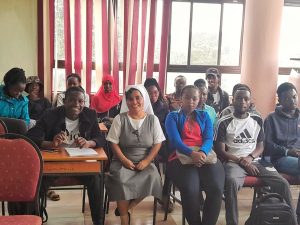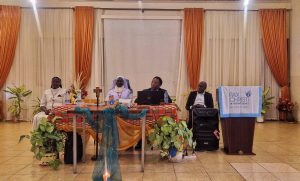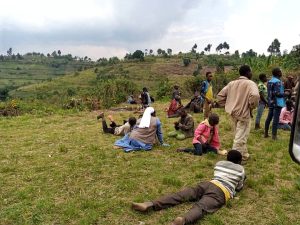From 3 to 16 August, a Training of Trainers (ToT) programme took place in South Sudan, aimed at a group of religious sisters actively engaged in their local communities. The initiative sought to strengthen their skills in key areas for the country’s future: active Nonviolence (ANV), peacebuilding, trauma healing, transformational leadership, and non-violent communication.
The course was attended by 10 sisters from 7 religious congregations, representing four dioceses (Juba, Rumbek, Wau, Tambura-Yambio). The sessions were facilitated by a team of trainers from Kenya, who shared their expertise and valuable experience. Logistical support was provided by the local partner SSSA, which ensured transport, internal travel and accommodation for the participants.
Training for young people in Rumbek
At the same time, in the Diocese of Rumbek, a workshop was organised for 20 young people from various parishes, prepared and supported by the Loreto Sisters, who provided facilities and resources. The young participants received training on the same themes, with the aim of spreading messages of peace and reconciliation in schools, parishes and local communities. All costs for this activity were fully covered by the congregation.
A significant feature of this initiative was the creation of a WhatsApp group, enabling participants to remain connected, share testimonies, ask questions and encourage one another to continue their commitment. The Loreto Sisters will accompany the young people in their journey, while Pax Christi International will disseminate articles, photos and materials provided by the local trainers.

Outcomes and testimonies
The sisters expressed deep satisfaction with the skills acquired: not only techniques of active nonviolence and practical tools for conflict management, but also arenewed personal and communal vision. The young participants, in turn, will be able to transmit these values in their parishes and communities, helping to foster a new wave of hope in a country marked by conflict, insecurity and widespread poverty.

Prospects and recommendations
South Sudan is a vast and complex country (over 640,000 km²). The ten sisters currently trained represent a valuable seed, yet they are insufficient to cover such an extensive territory. It is therefore desirable to extend the initiative to other dioceses with a second ToT, and to support parish youth groups through microcredit schemes or income-generating activities.
In addition, the overall project duration of six months appears too short to consolidate such delicate processes of transformation. It is recommended to extend the timeframe to one year, in order to ensure more effective accompaniment and a broader dissemination of results.
Conclusion
The Training of Trainers in South Sudan has marked an important step towards building more resilient and inclusive communities. The testimonies collected and the enthusiasm of the participants confirm that, even in a fragile context marked by divisions, it is possible to sow the seeds of peace. Small seeds that, over time, may grow into a new culture of nonviolence and reconciliation for the entire country.
Pictures by Dieudonné Serukabuza
From 3 to 16 August, a Training of Trainers (ToT) programme took place in South Sudan, aimed at a group of religious sisters actively engaged in their local communities. The initiative sought to strengthen their skills in key areas for the country’s future: active Nonviolence (ANV), peacebuilding, trauma healing, transformational leadership, and non-violent communication.
The course was attended by 10 sisters from 7 religious congregations, representing four dioceses (Juba, Rumbek, Wau, Tambura-Yambio). The sessions were facilitated by a team of trainers from Kenya, who shared their expertise and valuable experience. Logistical support was provided by the local partner SSSA, which ensured transport, internal travel and accommodation for the participants.
Training for young people in Rumbek
At the same time, in the Diocese of Rumbek, a workshop was organised for 20 young people from various parishes, prepared and supported by the Loreto Sisters, who provided facilities and resources. The young participants received training on the same themes, with the aim of spreading messages of peace and reconciliation in schools, parishes and local communities. All costs for this activity were fully covered by the congregation.
A significant feature of this initiative was the creation of a WhatsApp group, enabling participants to remain connected, share testimonies, ask questions and encourage one another to continue their commitment. The Loreto Sisters will accompany the young people in their journey, while Pax Christi International will disseminate articles, photos and materials provided by the local trainers.

Outcomes and testimonies
The sisters expressed deep satisfaction with the skills acquired: not only techniques of active nonviolence and practical tools for conflict management, but also arenewed personal and communal vision. The young participants, in turn, will be able to transmit these values in their parishes and communities, helping to foster a new wave of hope in a country marked by conflict, insecurity and widespread poverty.

Prospects and recommendations
South Sudan is a vast and complex country (over 640,000 km²). The ten sisters currently trained represent a valuable seed, yet they are insufficient to cover such an extensive territory. It is therefore desirable to extend the initiative to other dioceses with a second ToT, and to support parish youth groups through microcredit schemes or income-generating activities.
In addition, the overall project duration of six months appears too short to consolidate such delicate processes of transformation. It is recommended to extend the timeframe to one year, in order to ensure more effective accompaniment and a broader dissemination of results.
Conclusion
The Training of Trainers in South Sudan has marked an important step towards building more resilient and inclusive communities. The testimonies collected and the enthusiasm of the participants confirm that, even in a fragile context marked by divisions, it is possible to sow the seeds of peace. Small seeds that, over time, may grow into a new culture of nonviolence and reconciliation for the entire country.
Pictures by Dieudonné Serukabuza




Leave A Comment